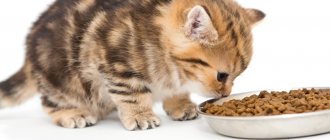With the onset of summer, many people move to their summer cottages and, of course, take their pets with them. In the heat, no cat wants to sit in a stuffy apartment, but here there is freedom, green grass and sunshine. And everything would be fine, but the fluffy beauties and handsome men begin to walk throughout the entire dacha village and go to the toilet where they like. What if your neighbor has not one, but five cats, and all of them have taken a liking to the children’s tent that is located on your property? The “fragrance” marks eat into it so much that soon it will be impossible to play in it. A separate discussion is about the piles in the garden beds. All this causes understandable dissatisfaction and a completely logical question: “How to keep cats away from the site?”
Trouble in the garden
Try talking to the animal owners first, if you have any. If there are stray animals walking on your property, notify the special service. They will take the cats to the distribution cattery. But let's assume the first option. Since it is advisable to discourage cats from the area for good, tell the owners about the “hooliganism” in your garden and what measures you are ready to take if “guests” continue to come to you.
Of course, the owners will be surprised that their little furries are causing you any trouble. Therefore, make a photo report in advance:
- Cats constantly mark the territory they consider theirs. If your neighbor's garden falls under this definition, then he has reason to worry. Males use not only urine for marking, but also a special secretion that, when it gets on plants, simply burns them. Of course, no one will be happy with a damaged flowerbed, the design of which had to be worked on all spring.
- Cats love to sharpen their claws on tree trunks, which causes them harm. This is especially true for young plantings.
- Cat litter in garden beds is extremely unpleasant. Moreover, this applies to the spring period, when these creatures simply dig up young seedlings when digging holes. And in summer the situation is no better. Who would like to dig up carrots that the neighbor's cat had diligently removed?
- The predatory creature will also hunt in your garden. The objects are not so much mice as birds, which many summer residents, by the way, attract to their garden plots. In addition, well-fed cats have a habit of leaving their torn prey on the paths. Unaesthetic...
- All cats love to bask in the sun, sometimes choosing a flowerbed or bed for this. What happens as a result is known to everyone.
Repelling cats when they defecate on the bed
Pets bring not only joy to their owners, but also inconvenience, starting to “misbehave” in the apartment, for example, by choosing a secluded place in the bedroom that is not intended for the toilet.
Before you start weaning your animal from such an unpleasant habit, you need to find out why it does it. Among the main reasons for this behavior are:
- Protest. When a pet is scolded or punished for something, it develops stress, and with such behavior the animal shows its disagreement.
- If there are problems with the genitourinary system, the act of emptying the bladder can be painful and the cat looks for a more comfortable and soft place for the toilet.
- Young kittens are often afraid to get out of bed on their own or do not remember where the toilet is, which leads to bowel movements in the bed.
- Some especially clean individuals do this when their tray is full; you should pay attention to the regularity of changing the filler in it and the problem will be solved.
- Cats whose owners are rarely at home or pay little attention to them begin to get bored and try to attract attention and diversify their lives with this behavior.
- Many elderly pets, having lived in a family for a long time, suddenly begin to shit on the bed. This is not due to a deterioration in character, but to the aging of the body; the animal could simply not have time to reach its tray in time.
- Cats are terrible owners, and the bed smells like the owner; by peeing on it, they mark their territory.
Dealing with “indecent” pet behavior
Having understood the reasons for this behavior of your pet, it is much easier to understand what motivates him at the moment of dirty tricks and begin to fight it. In order to minimize stress, you should be more attentive to the animal, caress it, and play more. Keep the toilet clean and wash it more often, install additional trays with other types of litter.
You can use essential oils or wash clothes with a fabric softener that has a lavender or citrus scent. But it is worth considering that not only people, but also animals have allergic reactions, so you should use the products carefully. A few drops of oil can be applied to the bed frame.
It is possible to wean an animal from the bad habit of relieving itself on the bed with the right tactics.
Attractive corner
Tell the owners of rowdy pets how to keep their cats away from their neighbor's property. To do this, you need to attract them to some corner of your garden. This can be done by installing trays (if they are toilet trained) or creating a special “cat” corner. There is a plant called catnip, or catnip. Very attractive, it blooms almost throughout the entire summer period and will decorate the site. Cats will be happy to visit this corner, sleep there and chew leaves. And if you pour sand there, then the toilet will be in one place, and not throughout the entire area.
By the way, if the owner has not responded to your requests, and the neighbor’s cat continues to periodically come to visit, then you can arrange such a corner on your site. At least the cats will only visit it, forgetting about the rest of the territory. Of course, there are no guarantees, but most animals really like the smell of this plant.
“Barrier plants” - living protection of the site
Cats instinctively avoid thorny bushes. The fact is that a cat determines how safe it is to get through an obstacle with the help of its whiskers. Since the cat's whiskers rest against many needles, the cat decides to avoid the plant.
This article was co-authored by Pippa Elliott, MRCVS. Dr. Elliott, BVMS, MRCVS is a veterinarian with over 30 years of experience in veterinary surgery and the care of companion animals. She graduated from the University of Glasgow in 1987 with a degree in Veterinary Medicine and Surgery. He has been working at the same animal clinic in his hometown for over 20 years.
Number of sources used in this article: 23. You will find a list of them at the bottom of the page.
You love your garden, but it may also be that all the neighbors' cats also love it. If cats are using your garden as a litter box or chewing on certain plants, you probably want to know how to keep these frisky animals out of your flowerbeds and beds. You can create a physical barrier, making the garden unattractive to cats or deterring them. If all this does not help, try to make a truce with the cats and give them a separate area.
Popular publications
latest comments
How to protect your garden plot from a cat. Cat tricks. cats are garden pests. Plants that repel cats
Cats are one of the most beloved pets. However, freedom-loving cat behavior does not always contribute to order in our own, or even in a neighbor’s garden or summer cottage.
Natural cat repeller
If the reception is unsuccessful, then you should think about how to protect your area from furry invaders. And again plants come to the rescue. There are certain smells that representatives of the mustachioed stripes do not like and try to avoid. If eucalyptus, lemongrass and lavender are planted in the garden, they will not get into the garden. Moreover, the plants will perform two functions at once: they will decorate the area and work perfectly as a “scarecrow”.
The best in this class are wormwood and coleus. The only point: coleus is very heat-loving, so you will have to bring it home for the winter. These plants are planted around the perimeter of the site. Tobacco will be another useful plant, but in order for it to have the desired effect, you will need to dry the leaves and scatter them around.
How to protect your garden from cats
Use garden netting to cover areas in your garden that you want to keep cats .
Dense plantings (where overgrown leaves completely cover the bare soil) not only minimize the effort of maintaining the area, in accordance with organic farming principles, but also discourage cats from going to the toilet in the flower garden.
Cats prefer to dig in dry, light soil rather than wet, heavy soil. Improving the soil structure will help retain moisture inside and repel cats .
To protect birds living in your garden or neighborhood, place bird tables, feeders and bird baths in open, easily visible areas, close to natural shelter (such as shrubs). Buy and hang one or two bells on your cat's - they will make a sound that will attract the attention of birds and make it more difficult for the cat to hunt. There are electronic cat collars on sale with an ultrasonic signal that turns on when the cat makes a sudden movement or jerk during the hunt. Simultaneously with the signal, a small red light begins to flash, the light of which is clearly visible to birds. It's even better if you lock your cat indoors at night (night is the most active hunting time for cats).
Coleus caninus is believed to emit an unpleasant odor when touched that repels cats, dogs and hares.
There are harmless cat repellents on sale, of which there are three types. Affecting the sense of smell or taste - they are sprayed from time to time onto favorite but undesirable areas for cats . Electronic devices with a motion detector that emit an ultrasonic signal that is almost inaudible to humans, but very annoying to cats . Electronic devices should be installed in open areas where the signal will not be blocked by bushes or garden buildings. Water sprinklers (irrigation systems) with built-in motion detectors.
Natural repellents for cats include cayenne pepper (hot chili pepper), the peels of oranges and other citrus fruits, vinegar, and other strong-smelling substances. The leaves of Coleus canina emit an odor that is unpleasant to cats when touched. This type of coleus is quite heat-loving, so it is recommended to grow it as an annual plant or bring it indoors for the winter.
Pea gravel and broken stone are too sharp for a cat's delicate paws. The cat does not like to move around the area covered with these materials.
Material: Oksana Jeter, CountrysideLiving.net
Spices to help you
We continue to talk about how to ward off cats using available means. To do this, you can take aromatic spices. While the smell of black pepper seems attractive to you, people with mustaches can’t stand it. Therefore, feel free to buy peppercorns, chop them and scatter them along the beds and paths. A very effective product, but the downside is that the smell dissipates and you will have to renew it regularly.
You can experiment on your pet to find out what smell cats don’t like. Today we know that these are cayenne pepper, turmeric and ginger. You can mix them together, pour them into small bowls and place them along the garden. Don't forget to add fresh spices regularly.
Repellent odors
No less impressive is the list of scents that cause disgust, fear, and irritation in cats. Often the smell may not be associated with a threat, such as the stench of urine or excrement of a jackal, tiger, wolf, or fox. The pleasant, but very concentrated smell also repels the cat.
The domestic cat's sense of smell is inferior to that of a dog, but significantly superior to that of a human.
A cat’s sense of smell is responsible for more than 60-70 million receptors that perceive various odors, which is 20-30 times more than in humans.
An additional section, the Jacobson tube or vomeronasal organ, also helps to perceive traces of odor (very low concentrations). When an animal wants to more fully experience a certain smell, it opens its mouth slightly and exposes its upper incisors. This unusual grimace is called the Flemen smile.
With such sensitivity, strong odors literally “knock down” the fluffy. The concentrated smell of deodorant, perfume, or air freshener scares away your pet. In order to drive him away from the bed or favorite chair, it is enough to spray the fabric with cologne or perfume, and while the aroma lingers, the pussy will avoid this place.
“Chemical” odors are generally not pleasant to cats. They snort and sneeze at the aroma of acetone, toothpaste, shoe polish, earthenware cleaner and stoves. This is good, curious pussies explore the world not only with the help of smell, but also with taste. Cleaning and detergents can cause poisoning, burns to the mucous membranes, and convulsions.
The “chemical” odors of vinegar and laundry soap are quite safe, but quite effective. To get rid of puddles on carpet or furniture, just soak the fabric in table vinegar, sprinkle with baking soda, rub in the powder and wait 15-20 minutes. And then wash the stain with foam from laundry soap. The cat will not approach the favorite place for a long time, and the smell of urine will disappear (read more about how to remove the smell of cat urine).
Some volatile substances in plant essential oils are also unpleasant for cats:
- citrus fruits – orange, lemon, grapefruit;
- lavender;
- cinnamon;
- lemongrass;
- rosemary;
- onion;
- garlic.
Not only essential oils, but also juice and citrus peels repel. For a person, this aroma is not just pleasant, it evokes a feeling of freshness and cleanliness. Research conducted by perfumers has shown the amazing properties of grapefruit essential oil.
A drop of a magic remedy applied to a lady’s hair or body makes men make mistakes in determining her age - she seems younger. It’s not for nothing that in France citrus flowers – orange blossom – are added to a wreath or bridal bouquet.
But for the domestic cat, even a small amount of the fragrant substance makes her run away.
It is enough to dissolve a few drops of orange oil in water and spray the upholstered furniture so that the cat stops sharpening its claws on the corner of the sofa.
Polishes containing orange and lemon oils will also keep your pet away from bookshelves, porcelain and glass trinkets, and vases located on shelves and slides.
Cats do not like the smell of black or allspice. It is enough to make a decoction of pepper in water and spray it in the place where the kitten got into the habit of going to the toilet, and the baby will lose the desire to make puddles in the wrong place.
Pepper essential oil contains a potent substance – piperine. It causes a characteristic sensation of tingling, irritation, burning on the mucous membrane and causes sneezing. Even a small amount of piperine will make your cat feel uncomfortable and want to escape.
Phytoncides of onion and garlic have a similar effect on the mucous membrane. The concentrated smell of onions also causes watery eyes and a burning sensation in the nose. It is impossible to imagine how much this smell injures the sensitive mucous membrane of the cat’s respiratory tract!
To repel, just drop a few drops of juice from the onion or garlic pulp. You can rub the area with half an onion or place the cut vegetable next to an object that the cat should not approach. The whole head will not have any effect.
Essential oils of rosemary and lavender will repel not only winged pests, but also striped robbers with their specific smell. You can sprinkle the solution on forbidden places or place a living flowering plant in a pot. The main condition is bright lighting, as these are light-loving ether bearers.
It's much easier to keep cats away from your favorite furniture and rugs in your home. But mustachioed robbers love to dig into beds and flower pots. To preserve expensive flowers and shrubs, you can plant a border of lavender, rosemary, and decorative onions next to them. And periodically wipe the leaves of plants in pots with water and a drop of lemon oil or spread crushed citrus peels mixed with coffee grounds on the surface of the soil.
Each cat is individual, and she may unexpectedly like the smell that causes discomfort and disgust in her relatives. Before using the “aroma attack”, you need to observe what odors are unpleasant to a particular pet.
Preferences can change throughout life. A pregnant cat may well make a nest in mignonette or lavender, but an older cat will not react even to a very strong smell. You should create an individual palette of smells for your pet - pleasant and unpleasant.
There are a large number of different “repellent” sprays for cats on sale. According to reviews, the same product can literally stop a pet from “missing” the tray or damaging the upholstery in just 1-2 days, but in other cases it is completely useless in any quantity. And all because sprays are developed without taking into account the individuality of the four-legged member of the family.
Vinegar and ammonia
And to them you can add kerosene, gasoline, crealine and all other strong-smelling liquids. You don’t have to choose which smell cats don’t like from this list. They are all simply unbearable for the delicate sense of smell of delicate creatures. Therefore, we take old rags, moisten them with what is available, and scatter them throughout the area. Of course, this spoils the appearance of the garden, and in the evening it is much more pleasant to inhale the aroma of flowers rather than vinegar. But what can you do... But the cats will remember that your area is too smelly for them, and will avoid it. True, you will have to re-wet the rags every day, otherwise the smell will lose its pungency. But such a remedy won’t break the budget: vinegar is cheap and easy to purchase.
How does a cat's sense of smell work?
Cats are very sensitive to odors, both repulsive and attractive. Usually, when owners call on smells to fight hooliganism, they only remember the first ones, but the second ones are also effective.
The sense of smell of various animal species is usually assessed by the number of olfactory receptors. According to this indicator, a cat’s sense of smell is 14-16 times better than ours, and a dog’s is 42-64 times better. Cats smell more than just their nose. They, like some other animals such as dogs and horses, have a vomeronasal organ, which provides a peripheral sense of smell. People don't have that.
If you open a cat's mouth, you will find a small round flat formation immediately behind the upper incisors. This is Jacobson's organ, or vomeronasal organ.
With its help, they smell pheromones - special volatile substances with an individual odor that animals secrete to mark the border of their territory and attract individuals of the opposite sex. In addition, pheromones can transmit both anxiety and a sense of security between members of the same species.
When a cat tries to “sniff out” pheromones, he opens his mouth slightly, breathes a little faster than usual, and breathes shallowly. The expression on his face is quite specific.
Additional protection
If you have already tried the methods listed above and they did not bring the desired effect, then try other cat repellents. Some gardeners say mustard powder works great. They need to be sprinkled on paths in dry weather. Cats don't like bleach, but it's also harmful to plants. But if there is a rag tent or a swimming pool on the site, you can soap it with bleach so that cats don’t come close.
In addition, some gardeners make their garden inconvenient for cats to move around. To do this, a strip is made along the perimeter of the area, covered with broken stones, which are too sharp for delicate paws. Animals will try to bypass such an obstacle and walk on the soft ground.
How to care for coleus
The houseplant coleus loves light: the more leaves it has, the more sun the flower requires. Therefore, it must be placed in well-lit places. True, it should be borne in mind that in summer direct sunlight is contraindicated for it, but in winter it is even recommended.
Therefore, in winter, “decorative nettle” can live on the brightest windowsill, and in summer - in a room with good diffused lighting. As an option, you can protect the plant from sunlight by shading, which is especially important from midday and during the second half of a hot summer day. After all, direct sunlight can not only make the color of the leaves pale, but also cause burns. particularly sensitive to direct rays .
Accustomed to warm and humid tropical climates, indoor coleus flowers will appreciate increased indoor humidity. That is why many flower growers place “home nettles” in the kitchen - the air here is always warm and sufficiently humidified.
Dog on the property
Since it can be difficult to drive cats away from your property, and persistent animals keep coming back every day, it is recommended to get yourself a new pet. The dog will take great pleasure in guarding the boundaries of the territory all day long and giving a pre-arranged signal if the impudent muzzle appears again from behind the fence. Usually it is not even necessary for the dog to chase them. The very presence of the “enemy” on the territory is quite enough.
By the way, a domestic cat can also be a solution to the problem, because it will drive away strangers. It is enough to accustom him to the tray and do not forget to change the filler, and there will always be order in the garden.
Cats and their tricks
A cat is a freedom-loving and wayward animal that cannot be kept on the territory of a garden plot by any fences or hedges. There is no doubt that the cat will definitely go to visit neighbors and explore nearby areas. Not everyone finds our pets delightful and tender. And this is understandable. Here are just some of the traditional cat tricks:
Kittens go to the toilet somewhere around their house, and adult cats use the neighbors' gardens as a toilet. “Results” appear in flower beds and vegetable gardens, and cat are made where bulbs can be planted.
Cats are known to assert space. To do this, male cats mark their territory with urine and a special secretion, which, if they fall on flowers or vegetables, can burn them. Another identifying sign is the stripping of the bark of trees and shrubs.
Cats are hunters by nature, and therefore will gladly destroy mice and birds. If catching mice can please many gardeners, then the cynical killing of birds is unlikely to cause delight, because many make efforts to attract birds to the garden and leave special bird food. Young, inexperienced chicks, whom their parents take for a walk for the first time in early summer, are especially vulnerable to cats The situation becomes even more unpleasant when cats proudly bring half-dead, rather torn and bloody prey home to show off to their owners.
Cats love to relax somewhere in the middle of a flower bed or vegetable garden, lazily and comfortably lounging in the sun and not at all concerned about the safety of the plants. On their favorite route, cats make digs under fences and unsightly holes in hedges.
Other people's cats come through the cat door
If you have pets, then such a door is a real lifesaver. Pets come and go at their own discretion, without causing inconvenience to the owners. And suddenly the latter begin to notice with surprise the unpleasant smell in the room. After observing the territory, they realize that the neighbors’ pets come to them through the small door at the bottom of the main one. At the same time, they eat the “aboriginals” and leave odorous marks. What to do in this case? It happens that pets do not want to chase strangers, and the owners themselves have to take on this. Consider installing modern devices.
Effective methods of repelling using improvised means
You can scare away other people's cats from your dacha using various available means, some of which are not always humane. If you want to get rid of cats using humane methods, pay attention to the following points:
- Mulch the soil of the beds and vegetable garden. To do this, we need citrus zest, leftover coffee grounds, or the cheapest cigarette tobacco. Take one of the above ingredients and mix it with the soil in areas where you do not want cats to be seen. Cats hate these smells, and regularly mulching them will not only help keep cats away, but will also fertilize your garden soil.
- Get a small dog in your yard that, even while on a leash, will scare away cats with its barking.
- If you have a domestic cat, we strongly recommend that you move her indoors, as her smell, especially during heat, will force cats to make their way into your yard, overcoming any obstacles.
- If you find a strange cat on your property, you can use firecrackers, firecrackers, and even a starter pistol that fires blank charges.
- Fence the fence with barbed wire, cover all cracks and tunnels with metal sheets, and if there are trees whose branches extend beyond the boundaries of your site, cut them off.
- If you have the means, you can purchase a cage trap. As soon as the cat enters this cage, the door will close and the animal will be at your disposal. The cage is the most effective of all humane methods, since it does not drive the cat away to an unknown location, but rather catches it.
Ultrasound devices
A device for repelling cats from a property today can be found in almost every store for summer residents; it is not expensive or rare. These are ultrasonic devices that produce high-frequency sound. People don't hear it, unlike cats. Most models run on batteries, so it is important to change the battery every few months to keep it in working condition. There are not many reviews about the device, since it did not manage to gain popularity in our country. But, compared to the listed methods, the device is resistant to bad weather conditions. Its effectiveness does not decrease after rain, it does not erode.
The smell of other cats
When a cat is sexually active, she is interested in other cats. When the period of sexual arousal ends, the aroma of relatives begins to irritate the animal. An adult cat can become especially angry if another cat is placed on its territory. However, animals are more tolerant of kittens.
It's interesting that cats can communicate, make friends or fight without even seeing each other. They do this with their scents.
Effective help
In some regions it is not possible to obtain an ultrasound device. All that remains is to try all the listed methods in the hope that one of them will be effective. If the situation gets out of control, and the neighbor’s pets don’t want to leave you alone, you need to use something that scares cats away from your summer cottage with a 100% guarantee. Today there are a huge number of products on the market that are marketed as cat repellents. Some are designed for indoor use, others for outdoor use.
There are two main forms of these products: granules and aerosol. The second one shows itself best if you need to solve the problem of cat litter in the apartment. The spray is sprayed in places chosen as a toilet. In other words, you will have to spray everything except the tray. This form is not very convenient for a garden, although some walk around the perimeter every day and cultivate bushes and hedges. But it would be better to use granular formulations. They create a longer lasting effect and are easier to use. Simply scatter the granules around the perimeter of the garden and beds, as well as in places that cats have already eyed as a toilet.
How to repel cats: 5 popular store-bought products
There are many ways to help protect your home.
Store-bought drugs are aimed at:
- protection of furniture, equipment, shoes, walls from the presence of a pet;
- daring the animal away from the territory where it previously relieved itself.
They are often made in the form of sprays, which is convenient for use. Many products simultaneously repel and destroy stench.
Be sure to read:
The cat shows its tongue: physiological and pathological reasons, the opinion of veterinarians
Popular among owners are:
- JFC Pet Block Cat Repellent Spray by Nature's Miracle. The drug contains natural substances that do not cause an allergic reaction. Thanks to this, furniture and other areas of the house will be safe. The price for one bottle is approximately 450 rubles.
- Stop It Cat by " Beafar ". The composition contains methyl nonyl ketone, present in small quantities in fragrant rue. Rue is specific, somewhat reminiscent of acetone, which repels pets. To increase efficiency, the apartment should be treated once every 24 hours. The product costs about 550 rubles.
- Repeller spray “True Friend” from Vergas Soft. The spray has a 4 in 1 effect: it stops shitting, scratching furniture, leaving marks and neutralizes unpleasant odors. The asking price is about 130 rubles.
- Spray "Stop-Problem" from "Ekoprom". The name speaks for itself. Will wean any cat from the habit of relieving itself in the wrong place. The plus is that it can also be suitable for dogs. Cost – approximately 150 rubles.
- Spray “Repeal? Yes!" from BioVax. The product contains enzymes that repel cats and have a pungent odor. The product may cause allergies in humans. Helps mainly in weaning kittens, less effective for adults. Price – about 150 rubles.
The best brands
Some drugs are complex, that is, they are designed to repel dogs and other animals. Each manufacturer uses different ingredients. Most often these are essential oils and plant products, such as hot pepper. More expensive brands contain predator urine pheromones. Instincts tell cats that it is best to leave the area where a stronger animal lives. Popular and reliable brands include Shake-Away, Critter Ridder and Keep Off. When choosing a product from one of these manufacturers, you can be sure that the result will definitely be good.
Strong odors as a disciplinary measure
Before using aromatic “weapons”, the owner should understand that cats relate to smells completely differently than people. And if it seems to you that there is no smell left from the orange peels thrown from the table, then the cat can avoid this place for several more days.
Raising a cat should not be based on aromatic “therapy” alone
Therefore, when trying to discourage an animal from flowers or some places in the house, the most important thing is not to overdo it, since an excess of aggressively smelling substances can cause stress in the cat, and in the worst case, an allergy attack.
Some volatile substances pose a risk of choking in your pet.
For a cat to have a sudden attack of respiratory allergies, sometimes simply inhaling an allergen is enough, which can be essential oils, household chemicals, or even good perfumes. The fragile immunity of felines is not prepared to deal with such strong aromas that the human nose can barely detect.
Last resort
If all else fails, the owners of the site begin hunting for furry pets. Some watch them at the scene of the crime, others lure them with treats. After that, they give them a beating and send them back to their station. It’s not very humane, but usually after 2-3 “explanatory conversations” the cunning creature understands that retribution cannot be avoided, which means it’s better not to come here again. Of course, hunting a cat in the garden is a long and rather complicated job, so we recommend using one of the methods listed above. Proven repellent sprays from leading manufacturers will provide guaranteed results. But if it’s a pity to spend money on them (and they are not cheap), you can try traditional methods of fighting the invaders of the territory.
How to scare away a cat
Drive away using traditional methods
To make a simple repeller you will need:
- 4 drops of orange oil.
- 3 drops of lemon oil.
- 3 drops of lavender oil.
- Boiled water.
Product manufacturing process:
- Take 200 ml of warm water and then add oil to it.
- Pour the mixture into a spray bottle and shake well.
- Now you can spray this product in those places where your cat likes to shit.
Shake the bottle well before each use.
Using a spray
You can find many sprays in veterinary pharmacies, they all work well.










